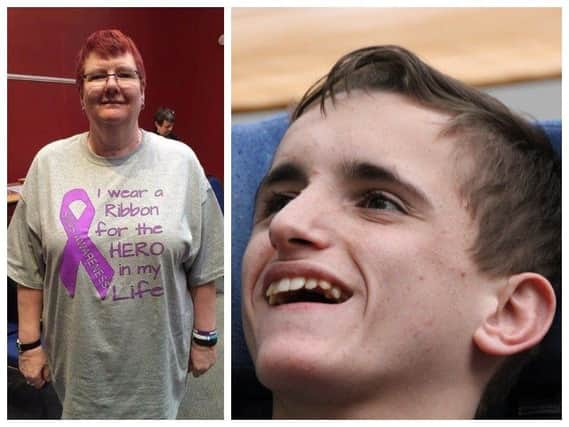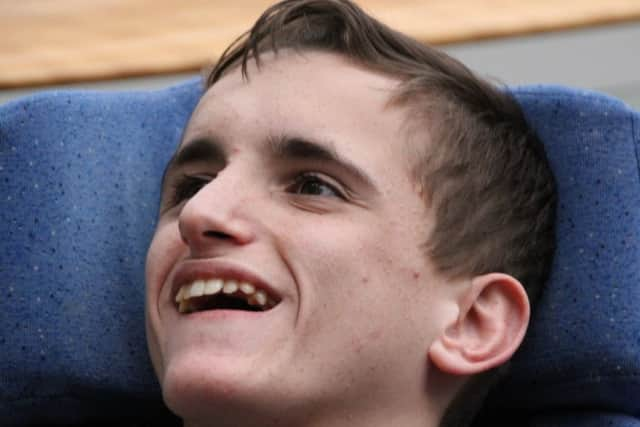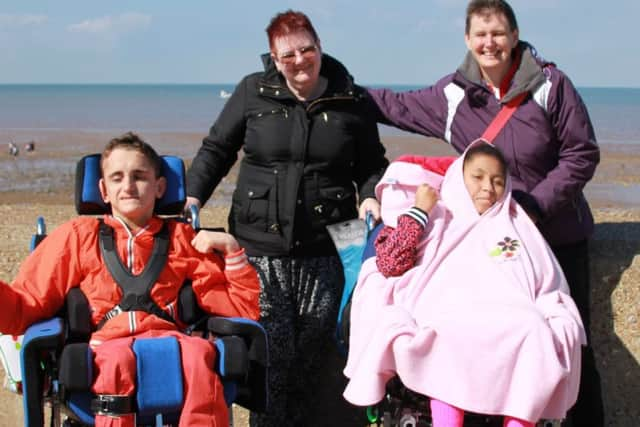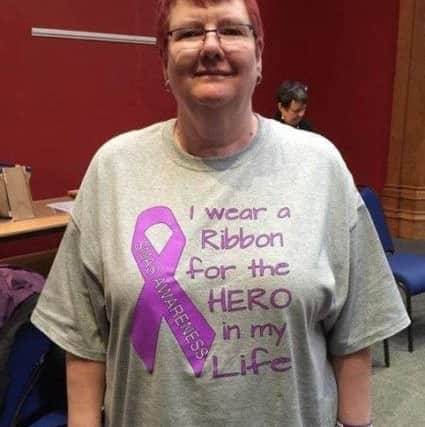Leyland mum's court battle to ease tragic son's suffering


When he was born, Timmy Pettitt was pronounced dead but after he was taken to the hospital chapel, he suddenly started breathing for himself.
It sums up his fighting nature and the way he fought hard against cerebral palsy, multiple disabilities, learning difficulties and health conditions.
Advertisement
Hide AdAdvertisement
Hide AdAfter surviving against all odds, Timmy went into foster care and was adopted by Alison Pettitt when he was two-and-a-half.


When Timmy was five, Alison adopted Chelsea, now 16, who also has cerebral palsy and when he was 10, Barbara joined their family.
Alison, 48, who lives in Leyland with Barbara, 58 and Chelsea, says: “Barbara actually fell in love with Timmy first. They had a special bond. Timmy would laugh outrageously whenever he saw her.
“Timmy and his sister Chelsea were very close. Chelsea is heartbroken at losing him.”
Advertisement
Hide AdAdvertisement
Hide AdTimmy died at the age of 20 in July last year after his health deteriorated causing him side-effects and breathing problems.


Alison and Barbara feel sad that Timmy went through so many struggles and suffered additional anguish in his final months.
As well as having cerebral palsy and epilepsy, Timmy, who could not talk, began having increased seizures a few years ago and suffered a loss of appetite and retched and vomited.
Medication did not seem to work and Timmy was referred to Sheffield Children’s Hospital for investigations.
Advertisement
Hide AdAdvertisement
Hide AdIt was then discovered that Timmy had a are bowel disease called Superior Mesenteric Artery Syndrome (SMAS) of which there are only around 500 cases in the world.


It was found that part of Timmy’s small intestine had become trapped and compressed between two arteries which was causing him pain, loss of appetite and vomiting.
Although Timmy was diagnosed in Sheffield, when he became an adult, his care was moved to Lancashire.
Alison explains: “Since February 2016, Timmy was fed through a jejunostomy tube because his stomach had stopped working altogether.
Advertisement
Hide AdAdvertisement
Hide Ad“He never really did well on it and just had more and more pain and more side-effects and breathing problems.


“We could not manage the condition at home and Timmy moved into nursing care last September and we went there to be with him all the time.
“As Timmy’s condition was so rare, he had a lot of struggles which affected him and us.”
Alison says she and Barbara ended up facing a difficult predicament as they realised that cutting Timmy’s food intake made him feel more comfortable.
Advertisement
Hide AdAdvertisement
Hide AdHowever, some health professionals in Lancashire felt that Timmy’s feed should be increased as he was getting thin.
Alison feels this is because they did not fully understand Timmy’s condition. She explains: “Some of the professionals who did not understand Timmy’s condition thought his feed should be increased.
“We did not want Timmy to die, but we did not want him to live the way he was either. His quality of life was abysmal for 18 months.


“We knew Timmy would die of this illness. But he was in less pain when he was fed less. But because Timmy’s condition was so rare, it was often misunderstood.
Advertisement
Hide AdAdvertisement
Hide Ad“For us, it was all about Timmy’s comfort and our whole reason for being was to make sure he was as comfortable as possible.
“To see him suffering more than was necessary was hideous.
“We knew by his feeds being reduced, Timmy’s life was not sustainable. But it was better than him being in pain.
“When Timmy was 42kg in weight, health professionals diagnosed him as being malnourished.
“When he died, Timmy was 26kg so was completely emaciated. It was truly awful.”
Advertisement
Hide AdAdvertisement
Hide AdThe matter ended up going to the Court of Protection as health professionals argued that Timmy’s feeds should be increased.
An independent expert made the recommendation to the court that the feed should be increased.
Alison says: “They started to increase the feed and four weeks later, Timmy started to have serious side-effects.
“We were fairly sure all along that Timmy would not cope with an increase in his feed because of everything we had been through with him and because we understood his condition better.
Advertisement
Hide AdAdvertisement
Hide Ad“Timmy had pneumonia and his blood pressure dropped and then he developed an illness.
“About seven weeks later, he died.”
Around the same time that the Charlie Gard case was going on where baby Charlie’s parents were fighting for the right for their child to live and try experimental treatment, Alison says she and Barbara were going through a battle of their own.
Alison says: “In Charlie Gard’s case and ours, the similarities were the differences.
“Although both children had incurable ailments, the parental and medical responses were reversed.
Advertisement
Hide AdAdvertisement
Hide Ad“In Charlie’s case, the parents went to court in order to continue to treat Charlie in spite of the medics wanting to stop believing it was futile.
“In our case, we went to court to prevent continued attempts to increase Timmy’s feed which we felt would prolong his dying and cause him increased suffering, not promote living.
“A person with speech would have been able to refuse feed and express their degree of pain.
“Timmy was unable to speak for himself or refuse the feed that was being pumped into his small bowel.
Advertisement
Hide AdAdvertisement
Hide Ad“Like Charlie Gard’s parents, we did not agree with the medics. We couldn’t find a compromise position with the medical professionals and wanted a judge to decide so that whatever happened, we had done our best for him.
“The judge was convinced by the expert witness gastroenterologist. However, we believe a different expert with a greater experience of this condition would have come to a different conclusion.
“Following the judgement, we watched Timmy’s quality of life ebb away as his feed was doubled in a few short weeks.”
Alison says Timmy loved his food until SMAS struck him at the age of 16. She says that all the things he had previously loved such as going on his swing, going for car rides and long walks in his wheelchair became too much for him.
For the last seven months of his life, he was bed bound.
Advertisement
Hide AdAdvertisement
Hide AdAlison says: “We believe that communication with families and health professionals must be improved to make good decisions for disabled children and young people.
“They were experts in their field and we were experts in Timmy. He had complex disabilities and a rare illness. We feel sad and distressed that Timmy had to go through additional anguish and that in his final months, instead of being with him, we were having to go to court.
“We were fighting just to keep Timmy comfortable.
“Timmy was not able to speak for himself and we were his advocates and did not want him to suffer more than he had to.
“We are glad that Timmy’s suffering has come to an end. But we have been left with this huge hole in our lives and miss our beautiful son.”
Advertisement
Hide AdAdvertisement
Hide AdA spokesman for Chorley and South Ribble Clinical Commissioning Group said: “We would like to extend our deepest sympathies to Timmy’s family at this sad time.
“The NHS has a duty of care to patients and the CCG acted in Timmy’s best interests in line with the mental capacity act.
“While we can’t comment further on the specifics of this case, we would encourage the family to address the CCG’s customer care team if they have any concerns.”
A spokesperson for Lancashire Care said: “Our deepest thoughts and sympathies are with Timmy’s family and friends and we would like to extend our sincere condolences to them at this very difficult time.
Advertisement
Hide AdAdvertisement
Hide Ad“Due to patient confidentiality, we cannot comment on the individual circumstances of the issues raised.
“We would, however, welcome the opportunity to speak directly to Timmy’s family to look into the issues that they have raised and offer our support to them.”